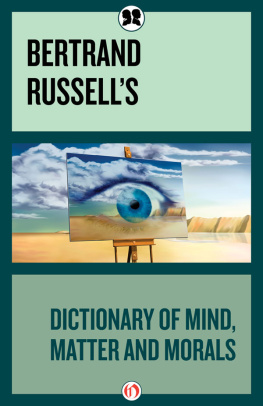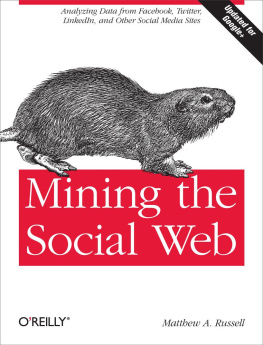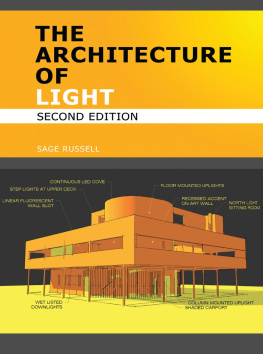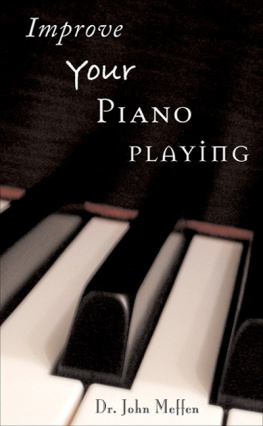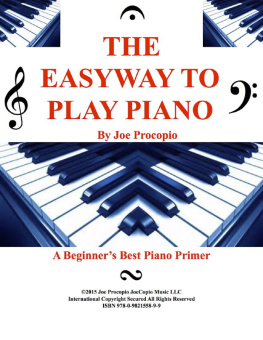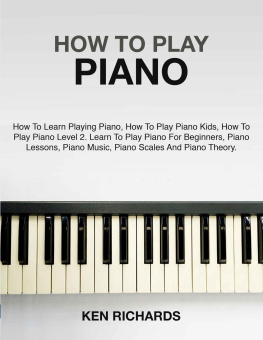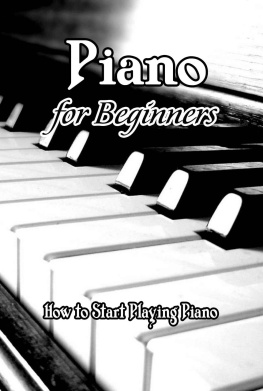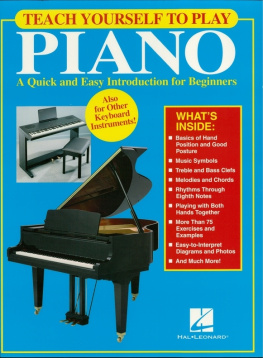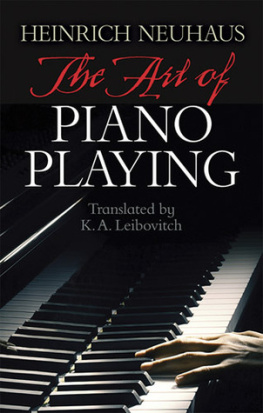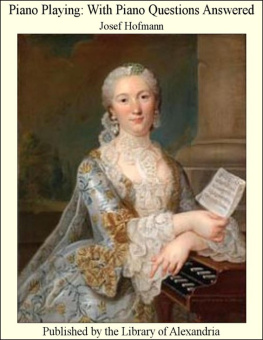First published in paperback by
Michael Terence Publishing in 2020
www.mtp.agency
Copyright 2020 Christopher Russell
Christopher Russell has asserted the right to be identified as the
author of this work in accordance with the
Copyright, Designs and Patents Act 1988
ISBN 9781800940413
No part of this publication may be reproduced, stored in a retrieval
system, or transmitted, in any form or by any means, electronic,
mechanical, photocopying, recording or otherwise, without the
prior permission of the publishers
Cover images
Copyright Layout, Abstract412
www.123rf.com
Cover design
Copyright 2020 Michael Terence Publishing
Contents
4. The Beginnings of: Learning to Play the Piano,
Reading Music and Sight-reading
9. The Pianist as a Musical Actor -
the Art of Communication in Performance
Introduction
This book is an encouraging companion to someones piano lessons in the exciting journey of discovery that learning the piano is all about. Like a good lesson, it aims to be a catalyst that spurs somebody on to greater achievements in their piano playing, their piano-teaching, or both. I hope this book helps many kinds of people: those coming back to the piano after a long gap for whom it might act as a useful bridge between rustiness and reaching a satisfying level, perhaps with the help of fresh instruction; teachers of the piano themselves, or those wanting to teach the piano who are seeking a little extra motivation; all those with a little prior knowledge of the piano wanting to read around the subject, and last but not least, anyone simply curious to know more about how the playing of such a difficult instrument is possible. It is a testament to human achievement that it is possible to play such a challenging instrument is a view I have heard expressed sometimes - although usually by people not themselves in the profession. Others immersed in piano-playing would often not think like this because it becomes as natural to play the piano as to eat or to drink!
1: Methods of Practising
Learning the piano is a great adventure. The process of learning so interesting an instrument should not be a big mystery, but we should always understand why each thing we are taught is as it is. This needs great patience and flexibility on the part of the teacher, as the image or description that helps one pupil may need to be different from the way of describing the same thing for another. If someone understands why an aspect of technique needs to be as it is, it is much easier to carry it out effectively than if the pupil simply does this because the teacher says so (please note that I am using the word technique in the broadest sense in my book). Also, the pupil should be encouraged to always ask the teacher about anything he or she is unsure of.
Some pupils may be starting from the beginning in learning the piano, without having already acquired any bad habits in their playing, therefore, but others may have had lessons some time ago and there may be bad habits in the playing, acquired during a long period of time practising without the guidance of a teacher. However, if there are particular weaknesses, the pupil and teacher can become aware of these early on in the lessons, and the pupil can keep, during practising, reminding him or herself of what needs improving, to make any weak areas become gradually stronger. If we assume this will not be possible to achieve, it is far less likely to happen than otherwise: in other words, stay positive, as the modern expression goes! Even very persistent bad habits can change until they become good habits, through sufficient reminding oneself of what to be careful of. Also, the person does not need to play correctly the weak aspect of technique as many times as it has been played incorrectly - the secret of success is simply to be doing the thing correctly a very high proportion of the time during practising. In fact, good practising always tends to rely on getting something right a high proportion of the time. If we aim to get something totally right each time we try to practise it, then perhaps we will sometimes make one or two mistakes, whereas if we assume we will make one or two, we may well, in fact, make four or five mistakes! Of course, in being really determined to play something accurately, we will often succeed completely in this.
The quality of our practising is what makes the most difference to our efforts to learn to play the piano well, the main goal for most students of the piano (see chapter 10). A very common misconception about piano-playing is that quantity of practising is the most important factor, but consider this: someone practising the piano for ten minutes a day really well will reach a higher level in their playing than someone who does ten hours a day of bad practising! Obviously, if that same person instead of doing ten minutes per day did thirty minutes per day, on average, of really good quality practising, there would be still better progress.
What is the most tangible benefit of high-quality practising? The answer is accurate playing. The reason why accuracy is so important in music is because the atmosphere of a passage of music tends to alter totally if there is even one wrong note. That said, we must not be afraid of wrong notes in our practising, but regard them as useful signposts, that show us what needs improving in our playing, so that we become able to play the piece as we want to.
The reason why even tiny children can become happily used to doing regular, good-quality practising is because they so like to be accurate in their playing - this is much more fun than playing badly, making lots of mistakes, because the music does not sound nice at all then! Let us now consider that which motivates an advanced pianist preparing for a diploma, for instance:-the desire to make the great work by Mozart, or Chopin, for example, reach a level whereby we feel we are near to what the composer must have intended becomes overwhelming if we are really interested in the piece. Both kinds of pianists long to not only play the piece well, so it sounds wonderful, but want it to become totally easy, so it can come right whenever they want it to. Of course, in the case of the mature pianist, different concepts and kinds of language will be used by teacher and pupil than in the case of the young child-pupil, but it is important to notice that aiming for accuracy is vital to both kinds of pianist. Whether the pupil is 5 or 50, we are talking about a human being keen to master the instrument, even if the 5-year-old does not yet know the word master but thinks in terms simply of playing well-empathy is very important in teaching. We have to be able to put ourselves in the pupils shoes, so to speak, to really understand what it is like to be someone of that age and stage, with those particular strengths and weaknesses of playing, trying to master that particular piece. You can see why the teacher of piano becomes so patient a person!
Because quality of practising is so important, we must try to practise at times when we have enough energy. That may mean practising early, before going to work, or it may, for instance, mean unwinding, and relaxing in a chair for half an hour, after coming in from work, before practising. If someone is so tired that they can only do a little good-quality practising that evening, then so be it - we can try to do extra practising the next time, to make up for it. Ten minutes of good practising, for instance, is better than ten minutes of good practising plus ten minutes of too-tired practising, because the too-tired practising will probably be full of mistakes, and we would become used to making those mistakes. In playing the piano, we have to become conscious of the fact that we are all creatures of habit, so that we absorb the habits of playing things well, just as we can, if we are not careful, absorb habits of playing things inaccurately. Therefore, practising well means always aiming for the acquiring of good habits in a determined manner. If we make a mistake we have never made before, in a scale or piece, we have nevertheless started to be in the habit of making that mistake when it has only happened once, but the good news is that we can, by being vigilant, spot the mistake, and then, by using good methods of practising, nip the mistake in the bud. Part of this approach is the using of the pencil by the pupil. The physical act of putting the marking into the copy allows what we have to be careful of to stick in the mind, and we hopefully notice the marking visually when we are about to play the particular bit in the future, also. At first use of the pencil builds gradually, but eventually, the pupil finds it so useful a tool that one reaches for the pencil nearly every time a mistake happens (unless one is, for instance, doing a complete play-through of the piece). Hopefully, by the time someone is at the stage of doing a play-through of the piece they are only making a few mistakes, at the most, and when they reach the end of the piece there is therefore usually a good chance of remembering where any mistakes came. We can then use the pencil, and nip those mistakes in the bud, using our instincts as to which methods of practising would be the most helpful for the parts affected. These instincts develop by relying on them more and more.




